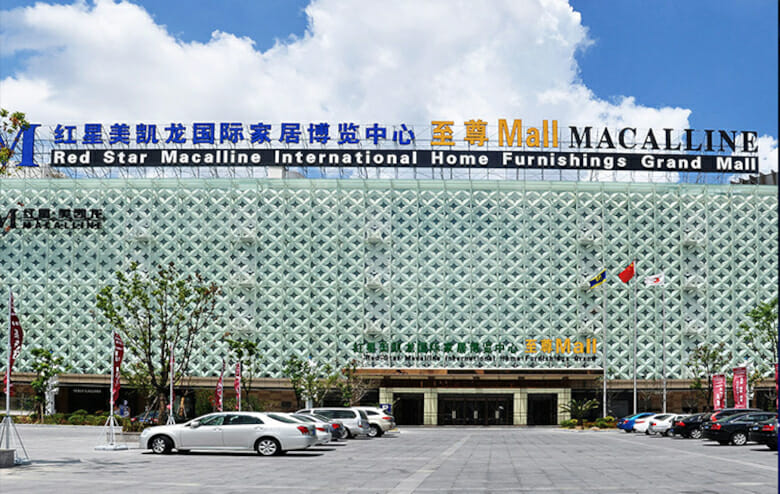
Occupancy at Red Star’s mall portfolio fell from 94 percent in 2021 to 92 percent in the first half of 2022
A Chinese state-controlled conglomerate has agreed to buy what could be a controlling stake in Red Star Macalline Group Corporation, an Alibaba-backed home improvement mall chain, as government firms continue to bail out China’s flailing private real estate sector.
Shanghai-listed Xiamen C&D Inc. plans to purchase around 1.3 billion shares in Red Star’s holding company, representing 29.95 percent of the mall operator’s total issued share capital, at a consideration of up to RMB 6.3 billion ($938 million), Red Star announced to the Hong Kong stock exchange last Friday.
The transfer of shares in the company, which ranked as China’s third largest developer in terms of operating income in 2022, to Xiamen C&D awaits approval by the relevant authorities, including the State-owned Assets Supervision and Administration Commission of the municipal government of southern China’s Xiamen, which controls Xiamen C&D.
But Red Star said on Wednesday that it had appointed Zheng Yongda, who has served as Xiamen C&D’s secretary of the party committee and chairman since April 2020, as a non-executive director at the mall behemoth, along with two other Xiamen C&D executives, Wang Wenhuai and Zou Shaorong.
Red Star also said that Alibaba (China) Network Technology, a unit of the mainland e-commerce giant, plans to exercise its option to convert exchangeable bonds for 248.2 million Shanghai-traded A shares in the holding company at RMB 8.44 per share, according to a separate Friday announcement.
Alibaba and its affiliates now hold 218 million shares in the holding company, or about 5 percent of the total share capital, according to an account by mainland real estate site Guandian after earlier holding around 13 percent with options to expand its ownership.
Board Changes
If the share transfer to Xiamen C&D is completed, Red Star Macalline Holding Group Company Limited may cease to be the controlling shareholder in the retail real estate firm, Red Star said in a filing on Tuesday. The proposed stake sale was first reported earlier this month.

Alibaba’s founder Jack Ma once saw opportunity in brick-and-mortar retail
Aside from the appointments of Zheng, Wang, and Zou, Red Star’s board also proposed the appointment of an executive from its own ranks, Li Jianhong, as an executive director. The personnel changes also included the resignations of Guo Binghe, Che Jiangfang, Jiang Xiaozhong and Chen Shuhong.
Guo had served as vice chairman and executive director of Red Star, while Che and Jiang were executive directors, and Chen was a non-executive director. Guo and Jiang had also been members of the board’s strategy and investment committee. Che Jianxing remains as chairman.
One of China’s largest commercial developers along with Dalian Wanda Commercial, Red Star generates most of its revenue from rents and related income at its portfolio of owned or leased shopping malls, which are spread across 224 cities. The collection spans a total mall operating area of 22.3 million square metres (239.7 million square feet).
Alibaba started buying what ultimately became a 13 percent stake in the mall behemoth in 2019, as part of a strategy to leverage the online shopping pioneer’s digital resources in the world of brick-and-mortar retail.
Mall Giant Struggles
In September of last year, Fitch Ratings withdrew its credit rating for Red Star Macalline, citing the holding company’s weak liquidity position and declining occupancy in the group’s pandemic-battered malls. The ratings agency noted that the mainland holding firm faced RMB 3.5 billion in potential bond redemptions and a further RMB 587 million in perpetual securities coming due before September 2023.
The holding group had also declined to buy back two of its malls which it had placed into an asset-backed securities scheme. Red Star’s Shanghai malls, which accounted for a quarter of its revenue, were subjected to three-month lockdown in the first half of last year, Fitch Ratings added.
Red Star Macalline took in operating income of RMB 16.53 billion in 2022, marginally below its 2019 figure of RMB RMB 16.86 billion and ranking it third in China behind Dalian Wanda Commercial Management and China Resources Land, according to data from mainland information provider China Real Estate Information Corporation.
Occupancy at Red Star’s mall portfolio fell from 94 percent in 2021 to 92 percent in the first half of 2022, with the ratings agency predicting furniture demand would slump amid a plunge in China’s new-home sales. Official data shows that new-home sales fell 28.3 percent by value in 2022 compared to the previous year.
Red Star saw total revenue of under RMB 7 billion in the first half of 2022, down 7.3 percent compared to the same period in 2021, according to the group’s most recent interim report. Rental and related income in its portfolio malls grew by 6 percent year-over-year, mainly due to the launch of new malls in late 2021, but income from its managed shopping malls dropped 22.7 percent.
“The decrease in revenue was primarily due to the delay in the progress of relevant services under the COVID-19 pandemic environment in the first half of the year,” the company said.

Leave a Reply